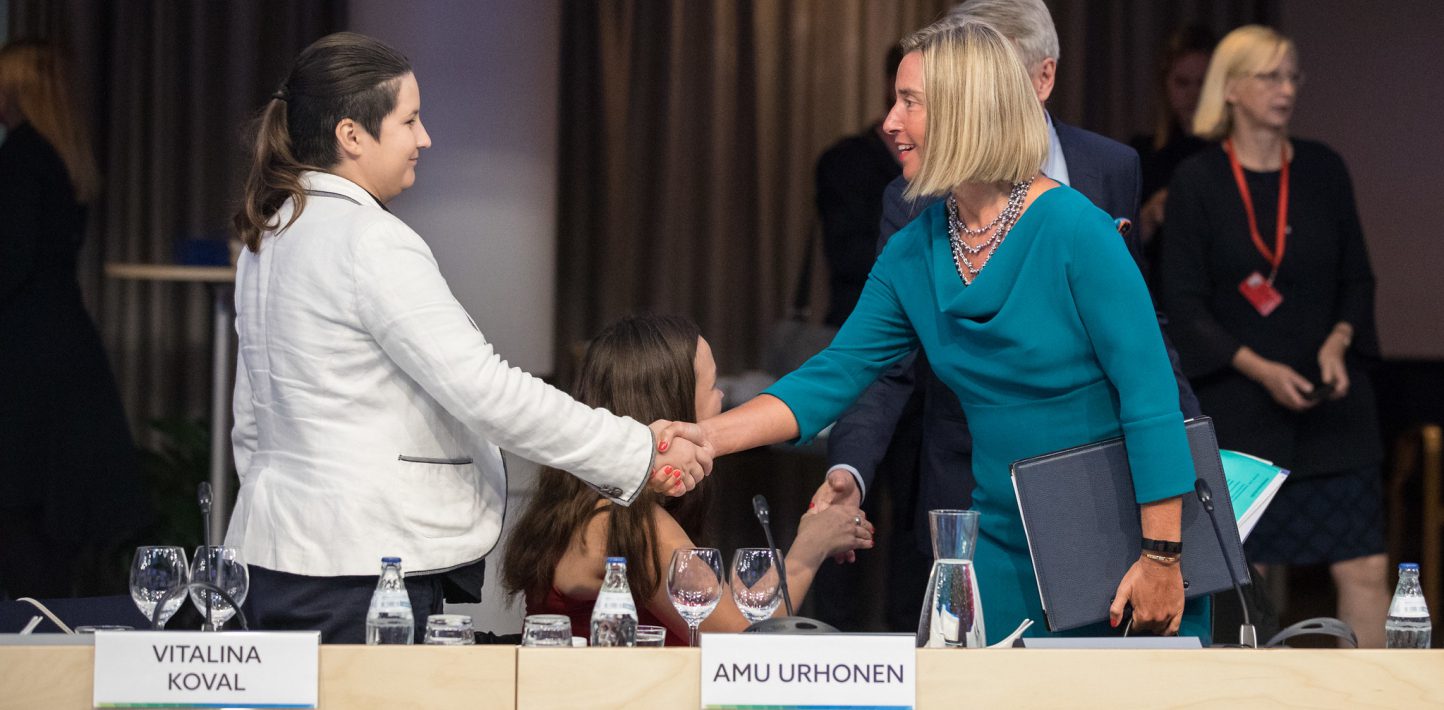First published in EU Observer:
https://euobserver.com/opinion/146154
by Eve Geddie, Director of the EU Office of Amnesty International
I watched on as EU high representative Federica Mogherini and Vitalina Koval, an LGBTI rights activist from Ukraine, shook hands.
Two strong women with much in common; not least that they have both faced and pushed back against gendered abuse for being in the public eye.
This extraordinary meeting took place in August at the Gymnich meeting of EU foreign ministers in Helsinki.
For what could be for the first time ever, foreign ministers sat at the same table with women human rights defenders from across the globe.
The women facing smear campaigns, threats and violence were able to tell officials face to face what they need the EU to do to better protect them.
This visible, innovative, high level meeting represented the epitome of what the European Union’s human rights defender policy can be, and we hope will be under the new high representative.
The handshake publicly demonstrated EU support for Vitalina and showed those who attack her in Ukraine that, right up to the highest political level, the EU will not let these actions pass with impunity.
It was an extraordinary meeting, but unfortunately also a rare one.
A report published by Amnesty International on Thursday (3 October) found that the EU’s commitment to protect and support human rights defenders like Vitalina in its foreign policy is not consistently upheld, not between nor even within countries.
The report looks at EU action for human rights defenders in Burundi, China, Honduras, Russia and Saudi Arabia, drawing on discussions with defenders and EU diplomats alike.
This is especially problematic now, because human rights are currently facing pushback from governments around the world.
Human rights defenders are at the frontlines of that pushback, facing spiralling crackdowns of attacks, restrictive laws, smear campaigns and surveillance.
Red paint attack
Vitalina Koval herself was attacked at a protest on International Women’s Day in March 2018, where she was doused with red paint causing chemical burns in her eyes.
The same attackers later took to social media to threaten her and other activists with further violence, and two activists were followed to their homes and beaten up.
Activists in all of the countries we examined testified to the difference that EU support can make to their work and lives in the face of repression.
But their testimonies also reveal how a lack of strategy and glaring inconsistencies in EU human rights policy can often undermine action to support defenders.
Saudi Arabia, China, Russia
Increasing restrictions suffocating civil society in Saudi Arabia have not been met with a clear response from the EU which rarely, if ever, speaks out publicly in defence of the country’s activists.
Meanwhile, despite complex relations with China, the EU uses much more public diplomacy to raise the cases of human rights defenders facing harassment, arbitrary detention and torture.
When Mohammad al-Otaibi, a human rights defender from Saudi Arabia was forcibly deported from Qatar despite having been granted a humanitarian visa by Norway, the EU and its member states failed to speak out in his defence and he was exposed to further injustice.
Our report did identify many good and even innovative ways in which the EU supports human rights defenders, for example by crowdfunding for training on digital security or using targeted social media to counter smear campaigns.
In an example of the impact that EU action can have, when prominent Russian human rights defenders Oyub Titiev and Valentina Cherevatenko faced unfounded prosecution, consistent, high-level and coordinated EU action contributed to the authorities’ decision to reduce the charges against Titiev and even drop those against Cherevatenko.
But, under the new high representative, these positive actions must be integrated into a strategy and consistently undertaken, rather than happening on an ad-hoc basis.
The EU and its member states need to set out a clear vision of how to defend defenders, by delivering on their human rights commitments across all aspects of the EU’s external action.
This should be backed up with results-oriented country-level action plans, global public communications strategies on how the EU raises the cases of individual defenders and efforts to join up various human rights policies on women’s, LGBTI and indigenous peoples’ rights.
All of these initiatives must take their lead from people defending rights on the ground.
We look forward to seeing the new high representative bringing action for defenders squarely into a coherent and united EU foreign policy in the coming years – and EU diplomats actively defending defenders in their daily work in EU delegations, as much as at summits and high-level visits.
We need EU foreign minister to affirm their commitment to promote and protect human rights defenders through foreign affairs council conclusions, giving crucial political backing at highest level to deliver robustly on EU commitments to defenders.
Very often, we have seen the EU champion human rights – even if it is currently punching below its weight for defenders at risk.
Yet that extraordinary handshake in Helsinki shows us how much more is still possible when defenders on the ground are empowered by those in the corridors of power.


